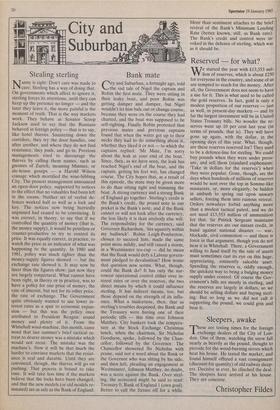Bank mate Olt) , and Suburban, a fortni g ht a g o, told the
sad tale of Nigel the captain and Robin the first mate. They were sitting in their leaky boat, and poor Robin was getting damper and damper, but Nigel wouldn't let him bale out or change course, because they were on the course they had charted, and the boat was supposed to be self-righting. Finally Robin protested that previous mates and previous captains found that when the water got up to their necks they had to do something about it, whether they liked it or not — to which the captains replied: 'Mr Mate, I'm sorry about the leak at your end of the boat.' Since, then, as we have seen, the leak has reached Nigel's end of the boat, and the captain, getting his feet wet, has changed course. The City hopes that, as a result of this episode, the mate may be given more to do than sitting tight and trimming the boat. A strong currency and a strong Bank of England go together. Sterling's credit is the Bank's credit, the pound note in our pocket is the Bank's note, and if the Bank cannot or will not look after the currency, the less likely it is than anybody else will. The responsibility for the currency, said Governor Richardson, 'lies squarely within my bailiwick'. Robin Leigh-Pemberton, chosen to succeed him, made the same point more mildly, and still raised a storm, in a Westminster tea-cup — did he mean that the Bank would defy a Labour govern- ment pledged to devaluation? How ironic that question now seems. What, though, could the Bank do? It has only the nar- rowest operational control either over in- terest rates or over the reserves, the two direct means by which it could influence sterling. It has indirect means, too, but those depend on the strength of its influ- ence. What a misfortune, then, that as sterling's troubles deepened, the Bank and ry the Treasury were having one of their periodic tiffs — this time over Johnson Matthey. City bankers took the tempera- ture at the Stock Exchange Christmas lunch, when the chairman, Sir Nicholas Goodison, spoke, followed by the Chan- cellor, followed by the Governor. The Chancellor showered Sir Nicholas with praise, said not a word about the Bank or the Governor who was sitting by his side, and then left, pleading an engagement at Westminster. Johnson Matthey, no doubt, was a score against the Bank. Over sterl- ing, the scorecard might be said to read: Treasury 0, Bank of England 1 (own goal). Better to call the fixture off for a while. More than sentiment attaches to the brief revival of the Bank's Minimum Lending Rate (better known, still, as Bank rate). The Bank's credit and control were in- voked in the defence of sterling, which was as it should be.










































 Previous page
Previous page